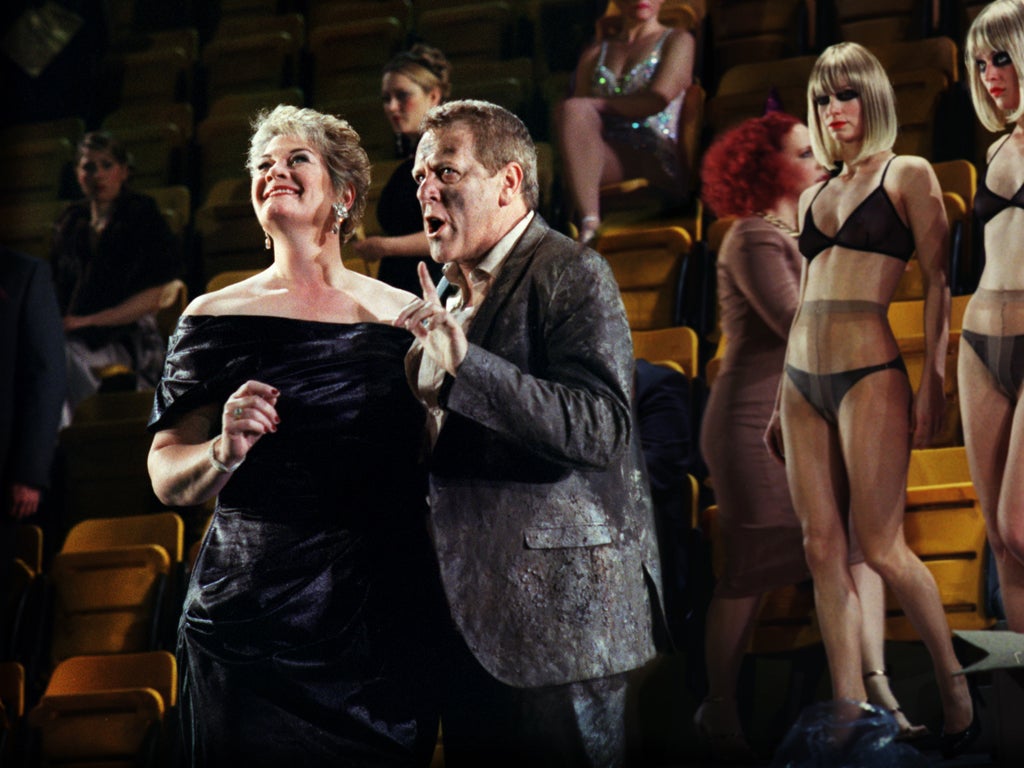Caligula, Coliseum, London King Priam, Dome, Brighton The Beethoven Encounter, Queen Elizabeth Hall, London
English National Opera does a good hatchet job on an updated bully, but it is the bliss of new generation music-making that resonates

'I look in vain for philosophy in these four acts," noted Albert Camus of his play Caligula, written in 1938 as Europe stumbled wearily towards war. Grandiose in its Straussian orchestration, its sequinned set pieces, its opening scream, its closing shout, its ambition to uncover a universal truth about dictatorships and its Hammer Horror 25-note signature chord, Detlev Glanert's 2006 adaptation has a similar absence at its core. Take away the armies, henchmen and sycophants, and all that remains of the infamous Roman emperor is a small-town psychopath.
Benedict Andrews's ENO staging of Caligula plays with the notion of emptiness. In Ralph Myers's set designs, a section of a sports stadium stretches up to the flies, sporadically dotted with trembling courtiers, dancing girls, cleaners, a desultory heap of body bags or withered floral tributes. Hair and suit streaked with filth, the bereaved Caligula (Peter Coleman-Wright) wanders distractedly through the vacant rows of seats, mourning his sister, Drusilla (also his lover), a silent, naked sylph in a bridal veil.
Glanert's colours and textures are carefully varied: a silt of dank harps and quivering flutes for the maddened emperor, twinkling celesta and tart clarinet for the amoral eunuch Helicon (counter-tenor Christopher Ainslie), a perfumed web of strings for Caesonia, wife, witness and willing victim. Laws are passed, taxes imposed, poets slaughtered, nobles raped and murdered. Like Strauss's Salome, Glanert's Caligula is an attention-seeker and a bit of a bore. Dressed as Venus in a Botticelli wig and a gold lamé tunic, he shimmies in 6/8 time for a captive audience. After so much taunting, his death is less an assassination than, as Camus put it, "a superior suicide".
Translated by Amanda Holden, the libretto is crisp but unmoving. Though Glanert favours big, splashy colours, he shares his teacher Hans Werner Henze's fondness for clean vocal lines. Conductor Ryan Wigglesworth maintains clarity throughout a complex score. Ainslie's chilling Helicon is matched by concentrated performances from the conspirators. Yvonne Howard's Caesonia, whose role in the regime would doubtless be the focus of international media interest were Caligula alive today, is compelling. As her husband and ruler, Coleman-Wright glitters dangerously. A dictator devoid of ideology should be the most terrifying creature imaginable. Instead, Caligula is tawdry, albeit on a very grand scale.
Britten's War Requiem and Tippett's King Priam were premiered 50 years ago last week in Coventry. Listening to the BBC Radio 3 broadcast of Andris Nelsons' reading of the Requiem with the CBSO on Wednesday, I was struck again by its theatricality, whereas Sian Edwards' concert performance of King Priam with the Britten Sinfonia three days earlier had the simplicity of an act of remembrance. Austerely scored for knots of brass, strings or woodwind, solo piano or solo guitar, with raw interjections for chorus, Tippett's opera sags and blurts awkwardly and earnestly. Many of its characters are shrill, misguided, selfish or vain. Yet the central encounter between Achilles and Priam (the magnificent Alan Oke and Brindley Sherratt), as Priam reclaims the desecrated corpse of his son from behind enemy lines, says as much of the "pity of war" as Britten's sophisticated masterpiece.
The vogue for naming concert series in the style of Robert Ludlum novels (The Bruckner Project, The Liszt Project, etc) continued last week with Spira Mirabilis's The Beethoven Encounter. Composed during the same period, Beethoven's Fifth and Sixth Symphonies are twin miracles, the best of nature, the best of man, and an enduring reproof to dictators. As with Spira Mirabilis's performance of the Fourth Symphony last year, I found myself wondering just how distinctive this conductorless orchestra of young players from Orchestra Mozart would sound were I unable to see them. During the final movement of the Sixth, when the shepherd's song disappears, leaving just a trace of itself in the lilting pizzicato, I realised that what holds this ensemble together isn't eye contact or collective breathing, isn't even the placing of an up-beat from this or that player. It's joy.
'Caligula' (020-7845 9300) to 14 Jun
Critic's Choice
Ton Koopman, Dorothee Mields and the Amsterdam Baroque Orchestra launch London's Spitalfields Festival with wall-to-wall J S Bach at Christ Church, Spitalfields (Fri). In Suffolk, the Aldeburgh Festival opens with Oliver Knussen's Maurice Sendak double bill, Where the Wild Things Are and Higglety Pigglety Pop!, The Maltings, Snape (Fri).
Subscribe to Independent Premium to bookmark this article
Want to bookmark your favourite articles and stories to read or reference later? Start your Independent Premium subscription today.

Join our commenting forum
Join thought-provoking conversations, follow other Independent readers and see their replies